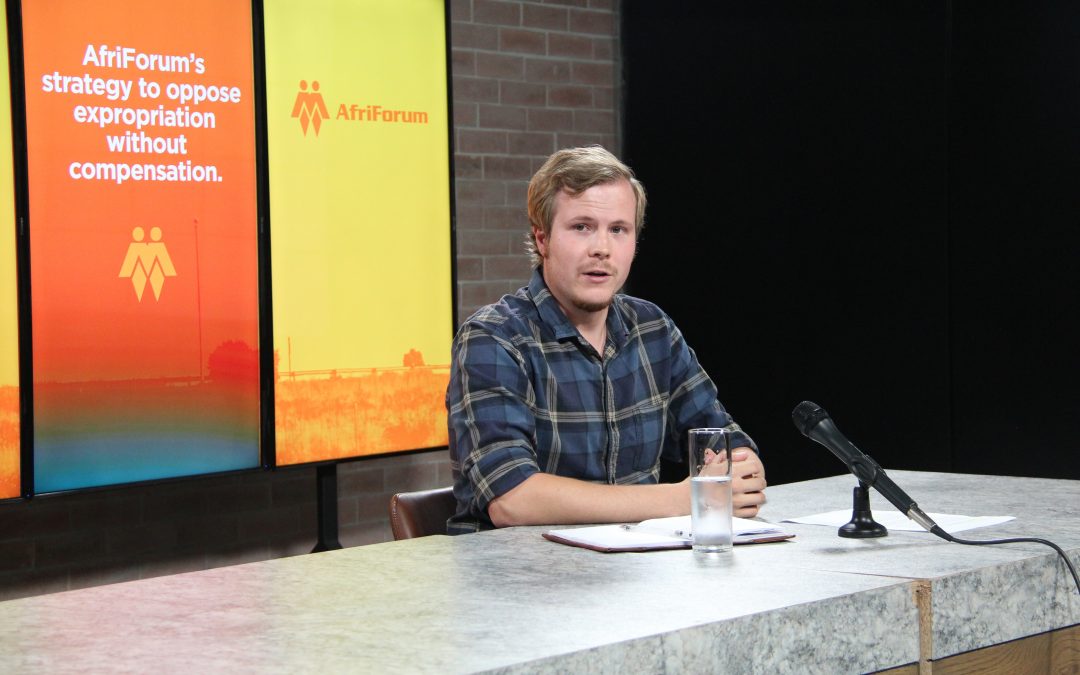To the entire Afrikaans community in South Africa and the diaspora of Afrikaners worldwide: let’s say good luck to Akademia and support it in any way we can! As many of you know, in this trying time in South Africa, key players within the Afrikaans community have pulled together to lay a strong foundation for young Afrikaans speaking South Africans.
First, I must say I’m not Afrikaans or a member of any Solidarity organisation; I’m just a concerned person who lives in this beautiful country of South Africa. I support AfriForum and Solidarity because they are great “government watchdogs” and support people who want to thrive. After watching the debate between Mr Kallie Kriel, AfriForum’s CEO, and Mr Panyaza Lesufi, Gauteng’s MEC for Education, I felt I had to write an opinion piece. What Mr Lesufi said in regard to the educational language policy really bothered me. This sounds like a blatant overreach of the South African government that oppresses the rights of minorities. These fascist tendencies from Government are not surprising because of the Communist roots of the ANC. They must know many who believe in democracy won’t accept this and are watching them.
Being an American I can say we are straightforward, which I know is not common here in South Africa. One topic I don’t hear people talking about is the difference between the cultures. I think people here in South Africa are afraid to talk about the difference between cultures because they are in fear of being labelled racist. This is not a racial thing in my opinion, so please don’t even think race. After decades of traveling and living on three different continents, I’ve been exposed to many different cultures. We know there is a difference between cultures and some thrive while some stagnate! Take Europe, which would be labelled as white, and the different cultures and nation states encompassing it. It is clear that some cultures there thrive more than others. There is inequality everywhere in the world, meaning different groups of people are unequal. We are all equal in the eyes of God but unequal in different aspects of life. We have to admit life would be boring if all of us were the same. Inequality is not inequity or the lack of fairness. Some people are smart, some are dumb, some are rich and some are poor; that does not mean that inequality is the result of inequity – it just means that people differ from each other.
Some cultures work harder than others and provide a better educational environment for their people, even in disadvantaged societies. Generally speaking Afrikaans culture is conducive to a thriving education. At Afrikaans institutions punctuality, personal responsibility, financial transparency and hard work are promoted. Also, I generally don’t see Afrikaners having children out of wedlock or having more children then they can afford. They do not spend beyond their financial means. They promote education and discipline. This in turn promotes a family-centred culture where the value of education can be instilled into a child and an environment conducive to prosperity can be established. I see this in Asian-American culture in the United States that outperforms all other cultural groups on a variety of levels. I’m not saying that other cultures in South Africa cannot cultivate a thriving environment because they do, but I see Afrikaans culture as a whole do an outstanding job and they should not be penalised with language policies that will have a negative impact on them. Equal outcome is not possible when you have inequality between cultures. Most people believe in cause and effect, so what you do has repercussions and naturally there is going to be inequality. There is inequality (differences) between cultures but the South African government wants equal outcomes for all cultures, which just can’t happen.
The language policy affecting Afrikaans schools is just the beginning of the slow dismantling of Afrikaans culture by the ANC government and the dominant culture of today. Don’t be blind and naïve because it’s happening. Today’s battles are not fought with guns but words and policies. It’s like going into a Christian school and taking away prayer, which is a vital part of the culture of the school. They see the difference in cultures as unfair (inequity) and are trying to make the cultures equal to have a so-called fair society by taking away the rights of Afrikaners. Government thinks that there must be injustice going on in Afrikaans schools for this imbalance and wants to change it. Language is the common bond within a culture and language is a vital part of why Afrikaans schools are thriving.
The degradation of Afrikaans is clear at all levels of society and not limited only to the ANC. In 2014 Dan Kgwadi, Vice-chancellor of the North-West University (NWU), said in a speech on the Potchefstroom campus that this university is not an Afrikaans university but a South African university with an Afrikaans feel. Starting with misrepresenting words to label the university is starting the degradation of the culture of the PUK, which was slowly cultivated since 1869. Everyone knows that the PUK is open to all people no matter their language or culture, just like religious schools are open to all faiths. This being said, all are welcome as long as they follow the inherent culture of the institution. Also, it bothered me when Mr Lesufi referred to today’s fight as remnant from the struggles of the past and therefor changes in language policies need to be made. He is saying that Afrikaners need to lose some of their rights to make up for the inequality of the past; this is blatant inequity and wrong. There has been 22 years of self-governing led by the ANC and he is still blaming the past for today’s problems. Basically he conveyed that it is okay if a culture does not deal with the consequences of their actions. In other words, it’s ok to promote a lackadaisical education culture and to not deal with the repercussions of it. Mr Lesufi basically said that he wants equality for all by taking away the education language rights of Afrikaans speakers, which is clearly an aspect that helps them thrive. So they are being punished for utilising a part of their culture for the betterment of their people. There never has been and there never will be equality in society because people and cultures are different.
Recently I was at a Catholic primary school in Soweto and a public primary school in Tswaing Local Municipality in the North West Province. Both are black schools in disadvantaged areas but the one in Soweto has a 100% pass rate compared to an appalling pass rate at the one in Tswaing. The Catholic school has cultivated a healthy culture where students learn how to succeed. This culture did not come from funding or salaries but the dedication of the administration. Culture can be measured at all levels of society, from government level to family level. Parents who value good education want their children to be around people who take personal responsibility, work hard and promote a healthy culture at school and not complain or make excuses for a poor educational culture. This proves that any group of people can create a thriving culture. Simply put: hard work wins and the Catholic school does that, just like Afrikaans culture does.
The ANC government thinks that a larger group’s cultural rights are more important than that of minority groups. They also think that all people deserve to have what other successful people have, no matter what they personally contribute, even if they make poor decisions and lack necessary skills. Individuals need to live with the repercussions of their actions or lack thereof and they need to understand how it affects their community and cultural environment. They should be rewarded based on their merit, not their cultural identity. There is no doubt that there have been injustices in the past but to say that an individual’s actions do not matter as long as you are part of a majority group is troubling. To say that people deserve something unearned based on their culture or group is wrong and causes division within society. It’s easier to think of equality for groups than on an individual level. So, instead of honestly acknowledging the natural repercussions of ANC involvement in failing schools, they are saying that a right must be taken away from the successful culture to make it more equal for the less successful culture.
Yes, the educational system here in South Africa is in disarray. There is inequity in schools due to the inequality or difference in overriding cultures that directly affect the schools, from the ANC government to the school’s administration and the families that comprise the student body. It all comes down to personal responsibility, accountability and what you give back to your community. The Afrikaans culture that I see today is inherently humanitarian, promoting life in many ways. Why take away the language rights of a small minority with a proven track record of thriving education and economics if this will make it more difficult for them to thrive?
We know there are people and cultures that will always point the blame (which won’t change the past) and play the victim and will not be accountable, work hard and take personal responsibility. Many different cultures have been oppressed; the successful ones forgave and moved on. Mr Lesufi ranted about the past that he will not forget; okay, then forgive, take responsibility for the state of the educational system and do something to better the failing schools. Other cultures try to call Afrikaners racists when I have clearly seen they are not. They only want to thrive and hold onto their culture. People need to quit blaming apartheid for issues that impact the country. So stop playing the victim and take responsibility for your actions. If you’re not part of the solution you may be part of the problem; don’t be complacent.
Unfortunately, the debate between the different groups over the language policy in the educational system seems to be endless, a constant argument. I’m so impressed with and fully supportive of Akademia because they are being proactive to govern themselves and manage their educational future despite of the debate. There are challenges at all levels in the South African educational system. Each one of you is responsible for your own education, not your teacher, school or government. You get what you give!
We must commend AfriForum, Solidarity and all their supporters for being proactive to help the Afrikaans community thrive and hold a respected place in South Africa and the world. I agree with Mr Lesufi that all South Africans deserve a quality education. While we wait for this to happen, lets continue to fight for the rights of Afrikaans speaking people and build a strong private educational system starting with Akademia. Let’s work hard and do what it takes to change the culture within the education system and put an end to ineptocracy in South Africa. You will have to wait a long time for the hate, blaming and deferring of personal responsibility to stop. While you wait for others to change their behaviour patterns for the good, do what you can to change yourself and get yourself into a great university like Akademia. Also, financially supporting Akademia is essential to have Afrikaans flourish, so please be generous! Since most of us know how important a good education is, I encourage every one of you to donate to help Akademia thrive; it will have positive repercussions that will reverberate throughout South Africa and the world.
I would like to close with a quote from 1822 by James Madison, a former United States President: “A popular Government, without popular information, or the means of acquiring it, is but a Prologue to a Farce or a Tragedy; or, perhaps both. Knowledge will forever govern ignorance: And a people who mean to be their own Governors, must arm themselves with the power which knowledge gives.”
Bio: Michael Calhoun was born and raised in Southern California and has lived, worked and studied between South Africa and the United States for the last several years. He has written for non-profit and profit organisations as well as the US Embassy. International politics, African issues, travel and his Christian faith are some of his passions. He is very involved in the rural community on the farm in the North West Province where he lives.









